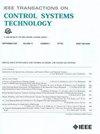在传感器噪声下实现势垒函数自适应是否合理?
IF 3.9
2区 计算机科学
Q1 AUTOMATION & CONTROL SYSTEMS
引用次数: 0
摘要
本文从理论和实验两方面研究了在已知上界有界确定性噪声存在下的势垒函数自适应行为。结果表明,在不连续噪声的情况下,输出的预定义性能可能会丧失。然而,如果根据扰动的上界选择势垒函数宽度(BFW),则可以断言输出的规定性能。在连续噪声的情况下,BFW的选择需要至少是测量噪声界的两倍,即不需要知道扰动的上界,并保证输出的预定义性能。在Lipschitz连续噪声的情况下,可以任意选择BFW,系统输出将保持在BFW。在有刷直流电动机上设计并实现了考虑不同噪声类别的实验研究,以验证理论分析的结论。本文章由计算机程序翻译,如有差异,请以英文原文为准。
Is it Reasonable to Implement Barrier Function Adaptation Under Sensor Noise?
This article studies the behavior of barrier function adaptation (BFA) in the presence of bounded deterministic noises with the known upper bound, both theoretically and experimentally. It is shown that, in the case of discontinuous noises, the predefined performance of the output can be lost. Nevertheless, if the barrier function width (BFW) is selected in accordance to the upper bound of the perturbation, the prescribed performance of the output can be asserted. In the case of continuous noises, BFW needs to be selected at least twice as big as the bound of the measurement noise, i.e., the knowledge of the upper bound of the perturbations is not needed, and the predefined performance of the output is ensured. In the case of Lipschitz continuous noises, BFW can be selected arbitrary, and the system output will be kept in BFW. An experimental study, considering different classes of noises, is designed and implemented on a brushed dc motor to illustrate the conclusions drawn from the theoretical analysis.
求助全文
通过发布文献求助,成功后即可免费获取论文全文。
去求助
来源期刊

IEEE Transactions on Control Systems Technology
工程技术-工程:电子与电气
CiteScore
10.70
自引率
2.10%
发文量
218
审稿时长
6.7 months
期刊介绍:
The IEEE Transactions on Control Systems Technology publishes high quality technical papers on technological advances in control engineering. The word technology is from the Greek technologia. The modern meaning is a scientific method to achieve a practical purpose. Control Systems Technology includes all aspects of control engineering needed to implement practical control systems, from analysis and design, through simulation and hardware. A primary purpose of the IEEE Transactions on Control Systems Technology is to have an archival publication which will bridge the gap between theory and practice. Papers are published in the IEEE Transactions on Control System Technology which disclose significant new knowledge, exploratory developments, or practical applications in all aspects of technology needed to implement control systems, from analysis and design through simulation, and hardware.
 求助内容:
求助内容: 应助结果提醒方式:
应助结果提醒方式:


